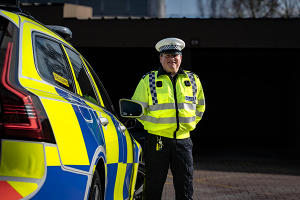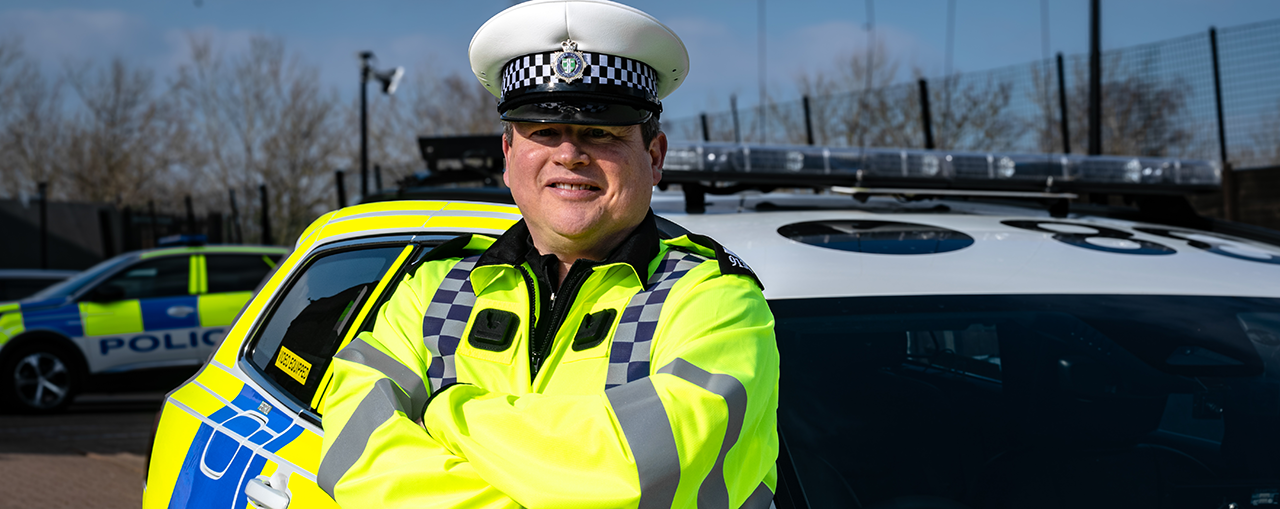The Special Road into Roads Policing
It’s been 13 years since Owen Swain attested as a Special Constable with Thames Valley Police. He now finds himself in the volunteer role of Special Sergeant as part of the TVP’s Roads Policing team, a Joint Operations Unit (JOU) with Hampshire Constabulary.
But how did Owen come to be in this role? Like many, he was drawn by a desire to serve the public and protect the community. In his own words;
“I wanted to do what all Police Officers do, I think. I wanted to help people more than anything.”
Originally wanting to enlist as a regular straight from school, a failed eye test cut those plans short.
“I’d worn glasses since I was about eight years old, and that was only because I was [practically] sitting on top of the TV!”
Fortunately however, laser technology meant that a simple procedure could get him back on track. With his vision now up to scratch, the notion of policing returned, and a conversation with his wife, who was already working for Thames Valley Police, proved pivotal. Up to that point, Owen had never heard of the Specials before, but learning about an opportunity to be involved with policing alongside his existing career seemed like an ideal balance.

With the Special Constabulary being a volunteer run organisation, those that put themselves forward to help protect our communities and make a difference to the lives of others usually do so alongside their own commitments, including their work. Owen is no different in this regard, so we asked him what he does in his day job as a self-confessed geek.
“I’m a geek! I work in IT – its telecoms, but it’s gone from the days of whirly, clunky stuff to everything going through a big computer now. I look after a whole team of engineers.
“I think it’s a bit of an escape from the world of being locked in dark rooms! So it’s a way of getting out. But for me, you get to work with amazing people as well. There’s a real team here.”
Since starting out as a Special Constable 13 years ago, Owen hasn’t rested on his laurels. As his volunteering experience with Thames Valley Police progressed, he found that there were opportunities to specialise – so how would he describe this progression?
“I was a constable when I started ‘on shift’ as it would have been (ICR – Incident and Crime Response). After two years I became a Sergeant and I was looking after 30 plus Specials at that point – but I always had an itch for traffic. It’s quite difficult to get into, even for Specials. There’s a process you have to go through and it’s actually quite a tough process. There is the application, then there’s boards, and you’ve got to know your stuff.”
Progression to Roads Policing meant him taking on an Acting Sergeant role before the position was made substantive. But does the step up come with extra responsibility?
“It does, yes. There is more of a pastoral role and I look after other Specials – we’ve just taken on another four. Looking after volunteers can be tricky because we don’t always work the same shifts.”
Are there differences between Response Policing and Roads Policing?
“It can be harder mentally sometimes, because you do deal with an awful lot of traumatic incidents as well as the day-to-day things like speeding tickets, although it’s a narrower point of law, almost. You’re dealing with traffic primarily, so that’s what you focus on.”
Another difference between Response and policing the roads across the Thames Valley is with the vehicles that are used. Owen was kind enough to explain what features one of these cars has.
Looking back over his time in the Special Constabulary, can Owen remember his very first shift out on response?
“Yes, I do! I remember it really well. It’s a great story actually. Everybody wanted to be on response because it was the one that 999 comes to, but with that came the nerves and anticipation of what was to come.
“We went to a burglary in progress, blue lights on, and arrived to find a family absolutely petrified. I remember it really well – they were all downstairs in the lounge and looked really scared. It was one of the only times I’ve racked my baton, and I went up the stairs…
“I’d love to say it ended heroically, but it was a bird that had got in and was flapping around! The point of the story is that it really tested me mentally and physically, because you don’t have the option of saying ‘I don’t fancy that’ – you just have to get on and do it.
“When I came down and told them there wasn’t an intruder in their home, they all let out a huge sigh and you see the relief on their faces. It’s exactly why I signed up.”
Having put in the hours on Response, his introduction to Roads Policing was a different proposition, as Owen explains.
“Traffic is slightly different and my first day would have been fairly routine. It would have been vehicle checks or the odd ticket. More than anything you’re just getting used to the new environment and how the team works. I remember dealing with an untaxed car. That was about it, really, so not quite as exciting – but I was so excited to just be there because it was a real achievement to get into traffic in the first place.”
Of course, on the road, it’s never as simple as just issuing tickets and checking vehicles. Accidents on the country’s roads can be devastating – not just for those directly involved, but for other road users, families, friends, and of course, those who arrive on scene. So what would dealing with an incident look like?
“Initially for us it would be securing the scene, making sure everyone is safe, including ourselves. My role may be to shut roads as we have the power to do so. We’re not here to stop people getting from A to B but we do need to make it safe. I always try and check in with my colleague to see if there is anything else they need, which might include finding witnesses and gathering statements.
“If something is particularly bad, for instance with a fatal accident, it actually makes our jobs a little more straightforward as the fatal collision unit will come out. Our task then becomes about securing the scene and making sure nothing gets moved.
“Dealing with the aftermath, as a department, we’re excellent for it. People look out for each other. They always have, and they always will do. There is a process in place now, and your manager will check up on you. There is a lot of welfare in place – I know where to access it if I need it. But I’ve got a good family as well, they support me a lot.”
Owen talks with fondness about his time on both Response teams and in Roads Policing, but it all had to start somewhere. That somewhere was at the Thames Valley Police training centre in Sulhamstead.
“It was weekends. Lots of weekends! It was really good quality training. You arrive with an inkling of what you’re going to be doing, because you had to go through a whole process to get there. They’ll teach you law, they teach you how to behave, look, and protect yourself as a Police Officer.
“I read in the interview with Ani, she said she loved OST (Officer Safety Training) and OST is great fun! There is new scenario-based training now, and it works really well. It used to be more about individual skills, but now it’s more about teamwork, and going through certain scenarios. I really enjoyed it.”
Since completing training and attesting 13 years ago, the challenges faced by policing have changed significantly – whether that’s time crime type police deal with, or public opinion regarding policing.
“I think the world is a different place now with social media the way it is. It’s very easy to show negatives, and it’s a lot harder to show the positives. But from my experience, everyone I work with is a total professional. They’re here to help people, but for every person you help there is always going to be someone that doesn’t like you being there. That’s part of the job.
“TVP, to their credit, have put a lot of time and effort into ensuring that we know what we should be doing, how we should be doing it, and backing it up with training.”
With all of this in mind, volunteering as a Special is clearly a big commitment. At the same time, it can give you a wonderful opportunity to make a tangible difference to the lives of those in your community. So how do Owen’s family feel about this commitment?
“My wife was the one that suggested it in the first place, so it’s her own fault really! My kids are very proud. My son would have only been one, and my daughter hadn’t been born by the time of my attestation, so all they’ve ever known is me being a Special.
“My parents were proud too and came along to my attestation. It’s a nice thing to do in front of your family, and TVP does make you feel that you’re doing something good. I’m well supported.”
If Owen’s story has inspired you to consider a volunteering role in the Special Constabulary, please take a look at our Special Constables webpage where applications are open now.



 Facebook
Facebook
 Twitter
Twitter
 Linkedin
Linkedin
 Instagram
Instagram